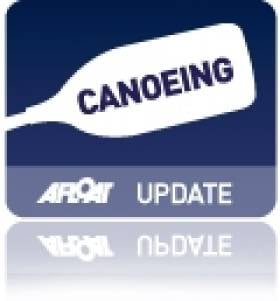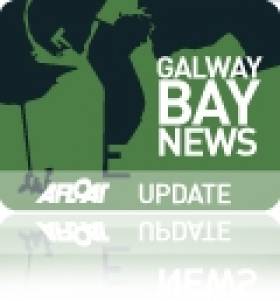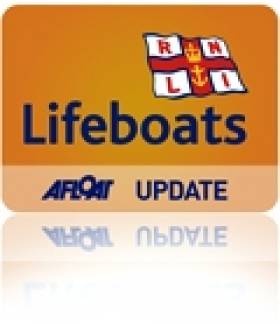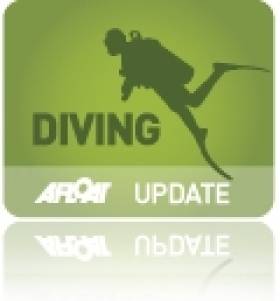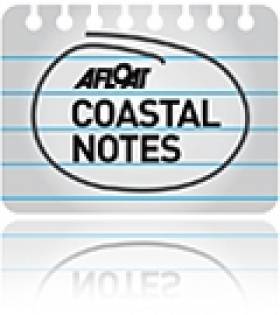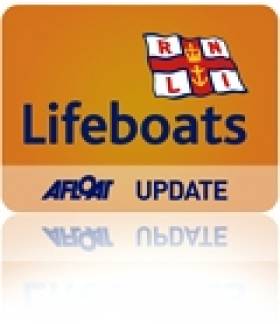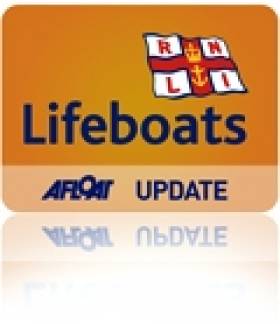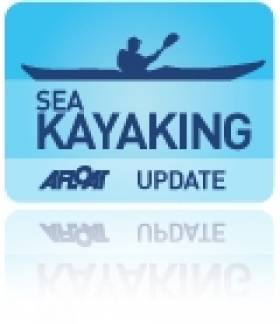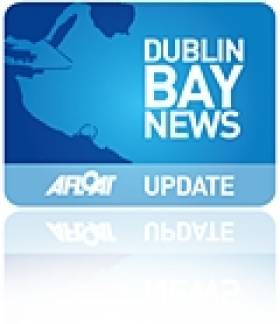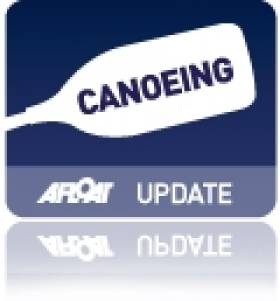Displaying items by tag: Charity
Canoeing Students Paddle The Shannon For Charity
#Canoeing - The Longford Leader reports on a recent canoeing adventure by four college students along the River Shannon to fundraise for the Irish Cancer Society.
The four set off from the Shannon Pot in Co Cavan, giving themselves 10 days to reach the Shannon Estuary at Limerick - more than 250km away.
And amazingly, they completed the challenge with two days to spare!
The Longford Leader has much more in the story HERE.
Galway Bay Charity Swimmers Raise €80,000
#GalwayBay - Even swarms of jellyfish weren't enough to stop the more than 50 swimmers who took a dip for a good cause in the eighth annual Frances Thornton Memorial Galway Swim last weekend.
As the Irish Independent reports, hundreds were lined up at Blackrock Tower in Salthill on Saturday 27 July to welcome the swimmers at the end of their 13km open sea swim from Aughinish in Co Clare on the south shore of Galway Bay.
And together they raised some €80,000 for Cancer Care West, bringing the total over all eight swims to almost half a million euro.
The Irish Independent has more on the story HERE.
#RNLI - Enniskillen RNLI will host the revived Castle Island charity swim and family fun morning in Enniskillen, Co Fermanagh on Sunday 11 August.
The swim traditionally took place each year with the support of the Blake family.
And Enniskillen RNLI have hailed as a "great honour" the opportunity for its local volunteer crew to revive the swim in association with sponsors Blakes the Hollow, Western Cars and The Print Factory.
The 750m swim on Lough Erne is open to swimmers of all ages either individually or in small groups such as youth clubs, sports clubs or simply groups of friends.
Enniskillen RNLI says the emphasis for this swim is for everyone to have fun and for that reason, if required, novice swimmers may complete the swim in a well-fitted lifejacket or buoyancy aid but must be confident that they can complete the distance.
Lifeboat crew not swimming themselves will also be present on the day to provide safety cover for the event.
Registration for the swim will take place at 12 noon on the day, followed by a short safety briefing. Sponsorship forms are available by email or can be collected at The Wig & Crown, Blakes the Hollow and Western Cars. For further information contact Adrian at 07974 730456.
In other news, RTÉ Radio 1’s The Business will broadcast live from Bundoran RNLI lifeboat station this Saturday morning 3 August.
The focus of the show will be on the business of Bundoran being a seaside resort - a reputation the Donegal town has enjoyed for more than two centuries.
Speaking ahead of his visit, programme host George Lee said: "I'm really looking forward to broadcasting from Bundoran, particularly on a bank holiday weekend. I'm hoping to experience lots of surfing, slots machines and ice-creams.
"On the show we'll be looking back at the heyday of the dancehalls, we'll be joined by Bundoran regular Ramona Nicholas from Dragon's Den, we'll be speaking to two men making money from oil exploration and lots, lots more."
The Business is broadcast Saturday morning at 10am on RTÉ Radio 1.
#Diving - An Irishman who set a world record for long-distance SCUBA diving is preparing to double that incredible feat.
Christopher Healy set the Guinness World Record for the fastest SCUBA dive over a distance of 10km in October 2011 in an effort to raise funds for the Share a Dream Foundation, which raised the spirits of his son Stephen when he was diagnosed with Non-Hodgkin's Lymphoma.
The experienced diving instructor - who runs the Atlantic Diving School in Co Clare - followed a long line of Irish divers such as Declan Devine, Sean McGahern and Paul Devane who've either smashed or attempted to smash records in the field.
And Healy has since written a book, The 10K Record, about the highs and lows of his journey to breaking the record.
But this weekend he aims to double that effort - and raise more funds for Share a Dream and Temple Street Children's Hospital - by SCUBA diving an unbroken 20km route in Lough Derg.
Staring at Mountshannon Harbour at 3am this Sunday 7 July, Healy will travel underwater towards Scariff and back via Scilly Island to Killaloe, aiming to arrive around 3pm.
He will be accompanied along the way by a small flotilla of support boats to replace his air supply and record his journey for verification.
For more about Healy's 20km diving challenge and how you can donate, visit the Facebook page HERE.
Rockall Adventure Delayed By Heavy Seas
#Rockall - Endurance adventurer Nick Hancock has returned to port after having aborted his landing on the tiny island of Rockall in the North Atlantic.
As previously reported on Afloat.ie, the Briton was set to begin a two-month sojourn living on the minuscule rocky outcrop that experiences some of the world's largest waves inside an eight-foot water tank 'survival pod', in an effort to raise money for the Help for Heroes charity.
But The Guardian says heavy seas on Friday morning 31 May made landing on the island impossible, forcing his return to port at Harris in the Outer Hebrides.
"I'm disappointed, but not wholly surprised," he said upon his arrival. "We thought it was going to be all about the weather and swell, and we knew the weather window was really tight."
Hancock still hopes to get onto the island in the coming weeks and beat the previous solo stay record of 40 days set by SAS vet Tom McClean in 1985 and the 42-day record set by three Greenpeace protesters in 1997.
However, the rougher weather of late summer may scupper his plans to get off the island at the end of his stay if the adventure is delayed for much longer.
Ireland, the UK, Denmark and Iceland all lay claim to the disputed island northeast of the Donegal coast, which is 31m across at its widest point.
Butcher Couple Eschews Anniversary Gifts for RNLI Donation
#RNLI - Rather than accept gifts for their 50th wedding anniversary, a Portstweart couple have asked their family and friends to make donations to Portrush RNLI.
As the Coleraine Times reports, Ewart Toms and his wife - who are well known butchers in the area - raised £500 for the RNLI which they were more than happy to hand over to lifeboat station volunteers at Portrush.
They said: “We wanted to mark this special occasion in our lives, by making a donation to a cause close to our hearts, and to the volunteers who risk their lives to save others.”
The Coleraine Times has more on the story HERE.
Howth Duo Cycling From London To Paris For RNLI
#HowthRNLI - Howth locals Jennifer Murphy and Brendan Mulligan will be taking part in the London to Paris Bike Ride in aid of Howth RNLI.
The 377km charity challenge will take place between 23 and 26 August. Riders will depart from London and cycle past Hampton Court and through the North and South Downs to Portsmouth.
After crossing the English Channel on a ferry they will arrive in France at Caen and travel through the French countryside to Evreux. On the final day, all the cyclists will head to their final destination of the Arc de Triomphe in Paris.
Murphy said: "We decided to do the challenge for Howth RNLI because it is a local charity. We know some of the volunteer crew, including my boss!"
The duo are collecting sponsorships at their MyCharity.ie page HERE.
And according to Howth RNLI's Rise Michael, the funds they raise will ensure the north Dublin volunteer lifeboat crews can go to sea with the best equipment available, preserving their safety when saving lives at sea.
Meanwhile, Howth RNLI is hosting a 'boat jumble' sale at Howth Sea Angling Club from 10.30am to 1pm on Saturday 13 April.
All are welcome to bring along boat gear, fishing gear, dinghies, wetsuits, sails, books and any other nautical-related items.
Tables cost €20 each, with 25% of sales donated to the RNLI. Alternatively, items can be donated to ‘The Bosun’s Locker’ with all sale proceeds going to the RNLI.
The RNLI Sea Safety Team will be on hand to check lifejacket safety and give advice, and RNLI souvenirs will also be available. For more details contact Barbara Sargent on 01 832 5392 or Rose Michael on 087 255 2726.
Michael adds that the funds raised by the jumble sale will go towards Howth RNLI's current fundraising project to fund the running and maintenance costs of the lifeboat station for a week.
Top NI Surf Kayaker Set To Cross Irish Sea
#SeaKayaking - A Portrush teen is preparing to cross the Irish Sea by kayak for charity this summer.
Top surf kayaker Andy McClelland aims to raise funds for the Alzheimer's Society, Kidney Research and the Regional Respiratory Centre with his One Man One Boat campaign, which will see him kayak 22 miles across the open water from Donaghadee in Co Down to Portpatrick in Scotland.
The current Surf Kayak Junior World Champion will embark on his challenge in a high-performance sea kayak on loan from Rockpool Sea Kayaks and is presently planning his trip with fellow physiotherapy students at Ulster University Jordanstown as well as the Causeway Coast Kayaking Club.
McClelland has yet to set a date for the solo crossing, awaiting word on the best possible weather and sea conditions in May.
The Alzheimer's Society has more on the story HERE.
Harbour2Harbour Walk Around Dublin Bay This Sunday
#Harbour2Harbour - There's not much time left to register for the 2013 Harbour2Harbour Walk in aid of Aware on St Patrick's Day.
The 16.2 mile walk around Dublin Bay begins at 10.30am on Sunday 17 March, taking four to five to complete, and it's your choice whether you begin at Howth Harbour and walk to Dun Laoghaire Harbour or vice versa.
Organisers say over 1,200 people took part in las year's walk, raising more than €40,000 for Aware.
Apart from the great stretch of the legs and experiencing the beautiful vistas of Dublin Bay, the main aim of the day is to raise funds for Aware Support Services, and once registered to take part you will receive information on how to raise sponsorship.
Online registration is €20 per individual or €30 for a group of 2 (children under 16 are free). Late registration will also be available on the morning of the walk itself.
More information about the day can be found at Aware's Harbour2Harbour webpage HERE.
Larne Women To Paddle The Ban for Cancer Charity
#Canoeing - Larne women will be paddling the Bann this April all in the aid of a very good cause.
The 24-strong group from local fitness club BeFit, going by the title of the BeFit Challengers, will take to the water on 20 April for the start of a two-day canoeing expedition, along the River Bann and out to the Atlantic.
As the Larne Times reports, these ladies hope the challenge - and an epic mountain cycling event later in the year - will raise funds for Cancer Focus Northern Ireland.
BeFit owner Andrea Kernohan said: “I like to set the BeFit girls a challenge every so often, so that they have a fitness gold to work towards. I thought these Cancer Focus challenge events were perfect.
"Sadly this cause is close to mine and the girls’ hearts as so many people have been affected by cancer in one way or another.”
The Larne Times has more on the story HERE.


























